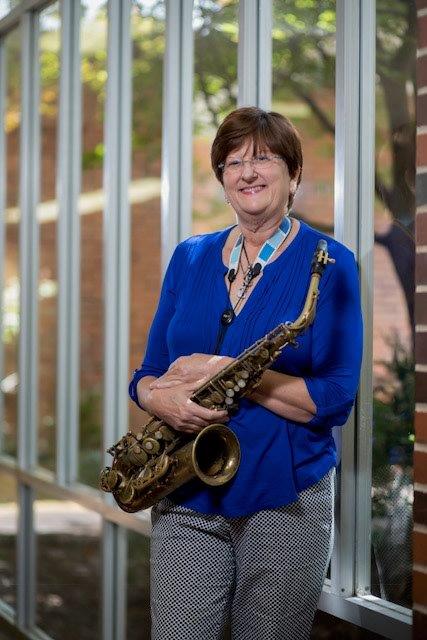Lisa Hittle discovered jazz as a seventh grader in Winfield. It wasn’t just the swing and soul of what’s been called America’s only original art form, it was the chance to do something creative with others.
“The jazz band gave me a place where I fit and belonged,” Hittle, a saxophonist and Friends University professor, said.
Hittle has spent the last three decades creating something similar at Friends, turning one not-very-good jazz band into a multi-faceted, award-winning program. She’s retiring May 31, but will first oversee the 26th annual Friends University Jazz Festival, which she started as a recruiting tool for those students.
The Feb. 15-16 festival is built around two days of clinics for some 850 high school, junior high and junior college students from around Kansas. It concludes with a concert at the Crowne Uptown Theatre featuring The Four Freshmen, an international touring group. Also performing will be the Friends Jazz Vocal and the Friends University Alumni Big Band, a group Hittle put together just for the occasion.
“We talk a lot in my program about it being family,” Hittle said. Indeed, when citing influences, Hittle names not just musical greats but a certain former football coach, known for his family-oriented approach and “16 goals for success.”
“Bill Snyder’s a big hero of mine,” she said.
“We really try to improve every single rehearsal, get better and better. I also try to make it fun. That’s why we play music. If you take the fun out of it, what’s the point?”
Both of Hittle’s parents were musical, her father played the trombone and mother performed on the piano and organ at weddings and funerals. She majored in music at K-State, leaving one semester short of graduation to go on the road with the Stan Kenton Orchestra. After returning to Manhattan to finish her degree, she moved to Vancouver, where she taught privately and played gigs. She moved to Wichita in 1980. Hittle taught at Bethel College one year and did a two-year residency with the Wichita public schools. She earned a degree in musical education from Wichita State University and then a master’s degree in clarinet performance, largely because she wanted to study under Dr. Jim Jones.
She went to talk to Cecil Riney longtime director of fine arts at Friends, and landed a job teaching music theory.
“The place just felt right. Cecil Riney was so supportive.”
However, the school’s jazz band – which Hittle soon took over – needed a lot of work. In fact, she recalled, “It was so bad that kids who could play didn’t want to play in it.”
Starting a jazz festival where young musicians from around Kansas could get instruction and inspiration from professional musicians was one move she made. Another was finding the money for scholarships, including partial scholarships for non-music majors.
“That’s one of the cool things about Friends,” she said. “Some of my best players have not been music majors. They’re now doctors and lawyers and all kind of things.”
The late oilman Carl Sebits funded scholarships for the jazz program, along with a new wing for the music building and stipends for guest instructors.
The festival and jazz program really took off after one of Hittle’s favorite performers, trumpeter Clark Terry, headlined the festival in 2000. Today, students can get a music degree with a jazz concentration. More than 50 students perform in one of the school’s two big bands, smaller jazz combo or jazz vocal ensemble.
Hittle found one more way to make the jazz program attractive to students and entertaining for the general public: paying gigs. She’s a regular performer at Wichita venues such as YaYa’s and Larkspur, often with a group containing Friends students. “That’s been a huge recruiting tool and pretty uncommon,” she said.
Hittle keeps in touch with many former students and is looking forward to dinner with alumni from at least nine states during the festival. One is her son, Nathan, a piano player and Friends graduate who’s now a lawyer in Virginia.
Hittle hopes to perform more than ever after May, stressing that her retirement is only from Friends.
Her biggest goal, which may come as a surprise to anyone who’s heard her play: get better on the saxophone. Hittle says her own playing has taken a back seat to instruction and administrative work. The teacher is ready to become the student again.
“I have so far to go.”









